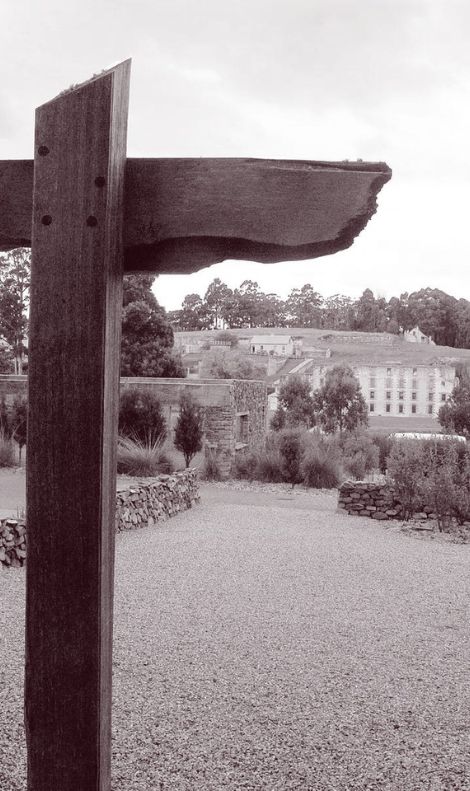
This one time I saw hope after the Port Arthur massacre
paul witnessed a shift in the behaviour of a belligerent student following the tragedy.
Autumn 1996
I’m in the last year of my teaching degree. I’m on my final 10 week placement and internship at Queechy High School in Launceston. It is the school my mother attended as an adolescent more than 30 years earlier – before she received an exemption at the end of Year 8 to help her mum at home and didn’t return. I’m supported by a great mentor and I’m actually enjoying the experience. I plan and run my own program with limited supervision.
I’ve developed a “sports education” inspired basketball unit that involves all students engaging in the multiple aspects of sport – coaching, playing, umpiring, and administration. I’ve split the Year 10 class up into small groups, and they rotate through the different areas of responsibility over the six week unit. While some play in the half court competition, some are umpiring, some are scoring, and others are filming on a hand held camera for later coaching and skill analysis. Inadvertently, students filming the competition record the theft of a pair of shoes. I discover this while reviewing the tape after class. I present the material to my supervisor and the Principal. The student is question is asked about the incident without knowledge of the video footage. He doesn’t admit it. His parents are called in, but they never show. It is explained to me that the student is doing it tough at home. The shoes appear without question a week later in the gym.
The kid in question is not alone. Scores of students at the school are from very low income homes. Intergenerational unemployment of their care givers is common. School is warm and reasonably safe. I suspect many of their homes are not. I use every opportunity I can to try and connect with the kids from hard places. I’m only 6 years older than them, and I earn some respect by being out in the yard every recess and lunch time. I kick the footy with the sporty kids; I wander and chat to the chatty girls; and I engage in tech-talk with the nerdy kids. But its the hard arse boys that I can’t access. They show sufficient respect not to be suspended, but they communicate loud and clear that I am not their friend, I’m not welcome. Fuck off.
The Monday morning after the Port Arthur Massacre I’m seated in Home Room with a Year 10 class. They are talking thoughtfully about the incident the previous day. There is a high level of maturity in their chatter. They too are trying to make sense of what happened just 2.5 hours drive from their home. There is no attempted humour, and no emotional outbursts. The students talk, listen, reflect, and sit in silence as more news is communicated about the death toll and how the previous weekend unfolded. I observe the kids from hard places. They are affected by this too. Many, I assume, know or witness violence, and they are equally stunned by the brutality of the gun man.
One of the hard arse kids chooses a seat next to me. Quiet at first, he looks at nothing out the window, and never attempts to make eye contact. After a long silence, he shares, “It’s all pretty fucked up, is n’t? I mean, fuck man. All those people. And kids. What a cunt!”. I ignore the language and tune into his debrief. “Yep, I can’t disagree with ya. How you doing?”. He drops his guard and shares a bit, about an uncle in gaol, and an older cousin that he misses. I assume his cousin in deceased. Our chat is interrupted by the bell. We never resume the conversation, but every time I spotted the kid in the playground after that he’d nod ever so slightly to acknowledge my existence. Equally I respect his by a subtle nod back.
Postscript
In the months and years that followed there was concerted political action on gun control in Australia. Amnesties, gun buy-backs, the restriction of semi-automatic rifles, semi-automatic shot guns and pump action short guns, as well as uniform firearm licensing was introduced across the country. It was a demonstration of political leadership at a time of national mourning. With bi-partisan support, laws were amended, and states and territories across the national supported the shift toward greater safety. There was protest and push back, and I do respect the views of those who opposed the changes, however, on balance, I believe the country is safer now than it was prior to 1996, and radically safer than our western counterpart, the United States.
That said, there is much work to do to pursue safety for families, particularly women and children from violence. There is significant harm inflicted on children and vulnerable people, often fueled by alcohol and other drugs. Significantly more resources are required to provide the mental health support for the community when and where they required it, particularly in rural and remote Australia that suffers from limited access to support services. Equally, measures to address income poverty, such as the universal basic income, or raising the rate of income support payments, will lift many out of poverty and desperation. Recalibrating resources toward public schools in hard places is a must if we are to fund and support the development of all children and their families in significantly disadvantaged areas.





